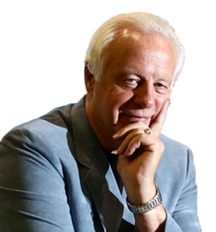From chaos to control: One concept that will transform your time management
One of the 25 Most Important Lessons I’ve Learned
By Dave Kahle
Note: This is one of a series of posts on the 25 most important lessons I’ve learned in my 30 + years of consulting and training.
“How many of you have too much to do and not enough time in which to do it?”

I’ve asked that question in almost every one of my seminars. You can guess the answers. Almost every hand goes up. The only ones who don’t raise their hands are the people who are a few months away from retirement and are starting to check out. It doesn’t matter what the job title is: Salesperson, customer service rep, manager, CEO, entrepreneur. Geography doesn’t matter either. I have seen the same response in Zimbabwe, Ghana, Mexico, Colombia as I do in the U.S. and Canada.
It is not just your job, it’s not your company, it’s not your industry, and it’s not your country. It is almost everyone and everywhere. It is one of the defining characteristics of the 21st century.
Because of the pace of change, the proliferation of media and the speed of communication technology, almost everyone is overwhelmed, stressed and distracted. Chaos reigns all around us. I like to call it the Age of Turmoil.
All this elevates time management to the top of the list of essential survival habits. Not only do we need to master it, but we also need to get it right. Our ability to function in our chaotic environment depends in large way on the decisions we make about how we use our time.
And that’s the rub for many people, who view successful time management as jamming more tasks into the course of the day. Their view revolves around the concept of efficiency. That’s what gives rise to the practice of multi-tasking – working on multiple projects or tasks at the same time in the pursuit of efficiency.
Under this view, if you are able to jam more tasks into the day, you are good at time management. That is a bit of a shadow accomplishment. Efficiency can help you use your time better, but it is limited. The businessperson in pursuit of efficiency often finds himself/herself successfully completing that which should not have been done in the first place.
John Maxwell said:
"Efficiency is the foundation for survival.
Effectiveness is the foundation of success."
And Peter Drucker once reflected: There is nothing so useless as doing efficiently that which should not be done at all.
Effective
A better approach is to focus on effectiveness. Whereas efficiency focuses on accomplishing more, effectiveness focuses on accomplishing that which is more important.
Here’s an example: Let’s say you’ve decided to make your living as a housepainter. You invest in all the latest equipment. The big day comes, and you paint your first house. You’re very proud of the fact that you have been incredibly efficient – it took you 35 hours to paint the house, and most painters would have taken 50. As you sit in your truck feeling pretty good about yourself you begin to create the invoice, you look at the contract and then back at the house, and a sick feeling crawls through your gut. You realize that you painted the wrong house!
You were incredibly efficient, and horribly ineffective.
So, what does it mean to focus on being more effective? The specific applications vary from time to time and situation to situation. And effectiveness is relative to the other things you could do. For example, what might be the most effective thing to do on Monday may not rank that high on Tuesday.
However, there are some general guidelines. Effectiveness speaks to the importance of the task. Something is important because it supports your higher values and/or moves you closer to your goals. These two issues can be easily translated into criteria to judge and rank every task. You can express the criteria as questions. So, in sorting through a list of tasks you ask these two questions of the list:
Which of these items most supports my core values?
Which of these items moves me closer to attaining my goals?
The answers will bubble up to the top the one or two things that are most effective.
As you can see, before you can determine that something is effective, you must have done some prior work. You can’t, for example, determine if some task brings you closer to your goals if you have no goals.
That’s one of the reasons I recommend a system of creating goals that includes annual goals, monthly increments, and weekly and daily priority lists. You can dig deeper into that here.
The same is true for your core values. You can’t determine if something supports your core values if you don’t know what they are. Taking some dedicated time to identify that which is most important to you is a valuable use of time. It’s always wise to create a written statement that articulates your core values. Putting it on paper forces you to be specific and implies commitment. It then allows you to review it and refine it every few years.
With those two pieces in place, you are able to move from efficiency to effectiveness, turning chaos into control. Apply them with discipline and you’ll have mastered one of the key success strategies of this turbulent world.
 Dave Kahle is one of the world's leading sales authorities. He's written twelve books, presented in 47 states and eleven countries, and has helped enrich tens of thousands of sales people and transform hundreds of sales organizations. Sign up for his free weekly Ezine. His book, How to Sell Anything to Anyone Anytime, has been recognized by three international entities as "one of the five best English language business books.” Check out his latest book, The Good Book on Business.
Dave Kahle is one of the world's leading sales authorities. He's written twelve books, presented in 47 states and eleven countries, and has helped enrich tens of thousands of sales people and transform hundreds of sales organizations. Sign up for his free weekly Ezine. His book, How to Sell Anything to Anyone Anytime, has been recognized by three international entities as "one of the five best English language business books.” Check out his latest book, The Good Book on Business.












